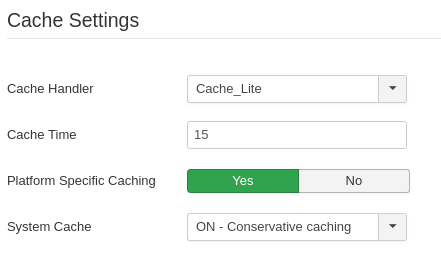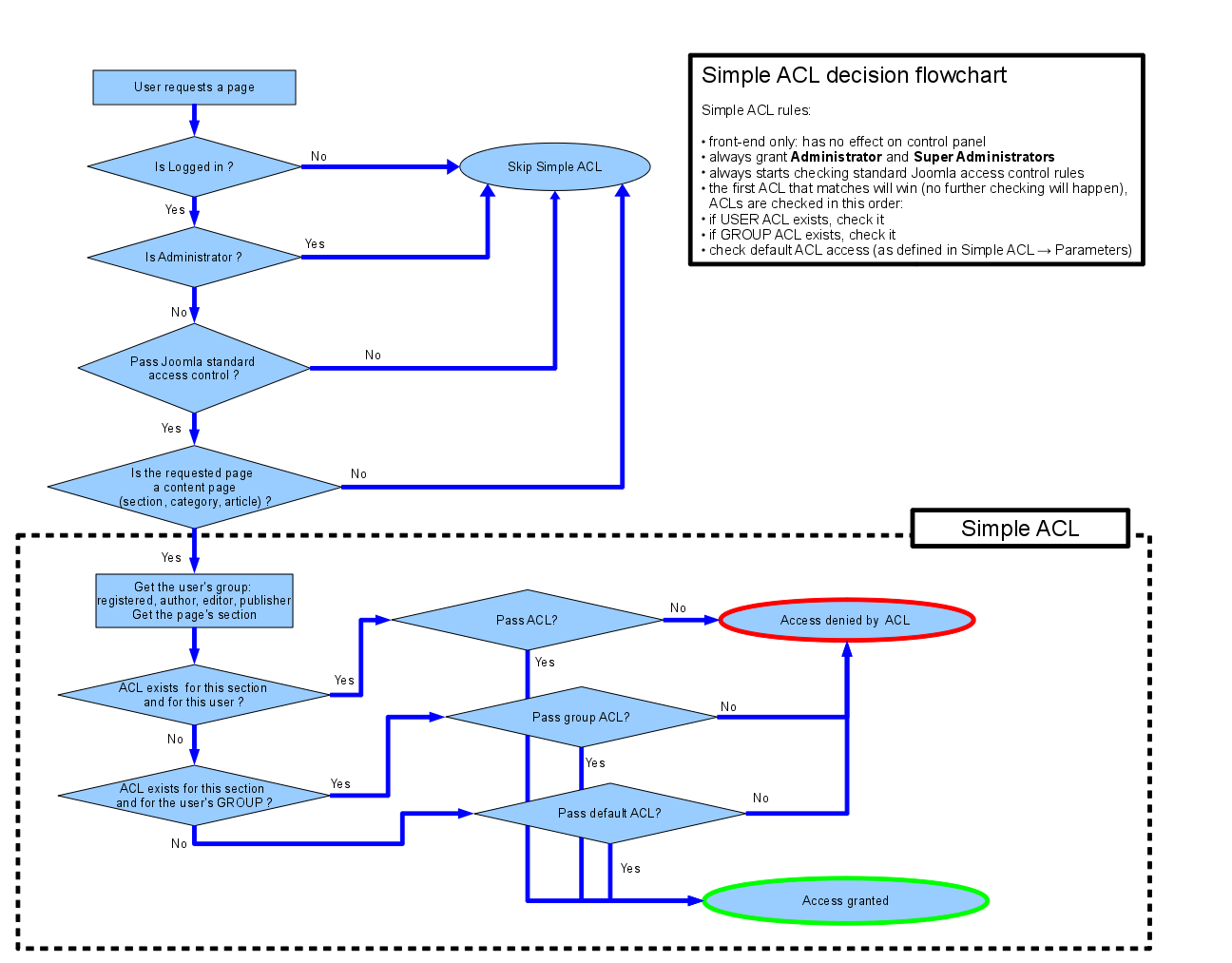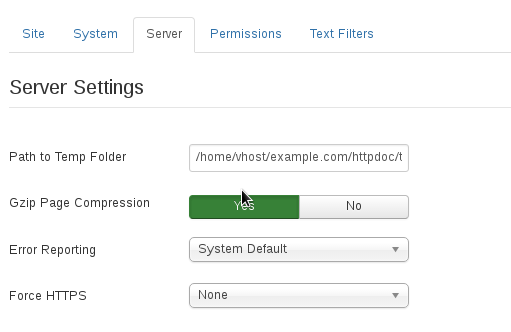How to speed-up Joomla performance on Windows Server IIS: 8 important, but simple, tips to improve & speed up Joomla. Add caching, gzip compression, set your sessions & optimize MySQL database functions... Provide your visitors with a blazing fast Joomla website!
Website optimization
For WordPress, a lot of posts are available to optimize WordPress performance. Drupal's performance can be improved with the BOOST module, and there's PHP optimization in general (Dutch article). But what about Joomla? Read on, how we optimize and improve Joomla's performance and loading speed easily.
Here are eight (8) tips for you!
Improve Joomla's performance with these 8 tips!

All Joomla changes and optimizations can be made through the administrator back-end, located at the /administrator URL, or by downloading and editing the configuration.php file. Don't know how to download and edit the configuration.php file? Have a look at my Dutch article on how to edit files through FTP (Google Translate the article, or just look at the screenshots).
Let's start tuning Joomla, speed-up Joomla with just a few config settings.
Joomla MySQL database functions
Current versions of Joomla can operate on MySQL, SQL Server and PostgreSQL database back-ends. For MySQL there are two interface choices: "MySQL" and "MySQLi". Nowadays every Joomla version supports the MySQLi database functions, so we want to use that.
The i in MySQLi stands for improved and is the recommended MySQL interface to use, and offers better performance.
We all know the old ext/mysql functions will be are removed from PHP in the near future. The ext/mysql extension is removed since PHP 7.
The specified MySQL interface is defined in configuration.php:
public $dbtype = 'mysql';Change this to mysqli:
public $dbtype = 'mysqli';Joomla Session handler
Optimize Joomla's session handler. By default, Joomla stores all session information in its MySQL database. This is ideal if both the MySQL database and Joomla website are on the same physical server. When it's not, this generates a lot of unnecessary traffic between the database and website, just to verify a session. For every visit. See this chart:
This, of course, is a performance drain.
Therefore, it's recommended to store Joomla session information on the web server's file system. This provides faster access to its session files and information. Especially on SSD's.
How and where sessions are stored is defined by the Session Handler: $session_handler. When the session handler is set to 'database', change it to 'none':
public $session_handler = 'database';public $session_handler = 'none';Of course there's Redis and Memcached as well to store your Joomla sessions.
Remove unused Components, Plugins, Modules, and Templates
Over time a lot of components, plugins and modules are installed, tested, and disabled on your website. This probably, goes for templates as well. When a request to your website is made and the PHP process starts up, it indexes all files in your website. Even those files of disabled components, plugins, modules and templates, simply because they are on the file system.
Going through the file system and indexing those unnecessary files takes up a lot of additional time (relatively), it's best to simply remove (delete by FTP) all unneeded files and directories.
Convert your Joomla MyISAM database tables to InnoDB
When you run Joomla on your website for a longer period of time now, chances are your database tables are still using the older and less performing MyISAM storage engine. It is wise to update and convert these tables to InnoDB.
The main reason is that InnoDB is actively developed and MyISAM is not. InnoDB tables provide better performance than old and deprecated MyISAM tables.
Also, make sure you have an optimized MySQL server.
Set up a Joomla caching handler with WinCache, Cache_Lite or File
Use caching in Joomla

If your web hosting provider has WinCache available on the web server, then this will give a great performance boost for your website. If WinCache is not available, use Cache_Lite or File as cache handler. Open up your configuration.php file, and set $caching to 1 (enabled, conservative), or 2 for progressive caching.
Set Joomla's $cache_handler to File or cachelite:
public $caching = '1';
public $cache_handler = 'File';
// public $cache_handler = 'cachelite';
// or 'wincache' if availableDon't forget to make sure your cache\ folder is writable.
WinCache for Joomla 1.5?
WinCache as cache backend is not supported on Joomla 1.5. You shouldn't be using an ancient version like Joomla 1.5 anymore! See Joomla's CMS versions for more information.
Anyway, if you'd like to add WinCache support for Joomla 1.5, grab Don Raman's wincache.php cache storage file from the blog post performance improvement in Joomla using WINCACHE user cache, and place the file in libraries\joomla\cache\storage. Now you can configure $cache_handler to utilize WinCache.
Joomla Gzip compression
Enable gzip in Joomla, because really: you don't want to have gzip disabled!
Gzip compression compresses the response body sent from the web server to the browser. A smaller file is downloaded faster, making visitors happy, and a happy visitor is a returning visitor. Gzip compression in Joomla! is also known as buffered output.
In your configuration.php file, locate
public $gzip = '0';and set $gzip to 1, to enable gzip compression in Joomla
public $gzip = '1';Let me repeat: Enable Joomla Gzip compression is one of the things you must do to make your website load faster. To Enable Gzip go to System > Global Configuration > Server - where you'll find an option Gzip Page Compression. Simply click Yes and Save.
To Disable Gzip go to System > Global Configuration > Server, set to No, and then Save.
Joomla optimization extensions
There are many extensions that try to improve the performance of your Joomla website. Like the earlier mentioned WinCache. Here are a few that I can recommend:
- JCH Optimize - Combines JavaScript & CSS, combines images into sprites, minifies and compresses JavaScript, JCH Optimize helpts to minimize expensive http requests.
- Jbetolo - All the functionality that JCH Optimize has plus CDN support, jbetolo primarily helps you with your front-end optimization,
- JotCache - Improves the built-in Joomla caching system, JotCache is advanced solution for page caching in Joomla
- Cache Cleaner - With Cache Cleaner you can clean your cache fast and easily via a link in your Joomla Administrator
Bonus tips: run an as high as possible Joomla version
Every new Joomla version comes with new optimized PHP code, functions and settings. Use them! Always run an as high as possible Joomla version to make use of these improvements.
Optimize and lossless compress images, minify JavaScript & CSS
Make sure your images are optimized for the web properly. Optimize and lossless compress images and minify JavaScript and CSS files is very easy to do. It drastically downsizes your website size (footprint), and making it load faster.
And further, curious how I optimized my web hosting? Learn how to do the same
Let's be honest, PHP is PHP, so whether you use Joomla as your CMS or Drupal or WordPress, most performance is gained through your PHP hosting environment. And MySQL, do not forget about your MySQL database server!
So read how I optimized my web hosting environment, and start doing the same.
Learn how to optimize PHP on your website or IIS web server? Or just to improve OPcache settings.
Conclusion
Out-of-the-box, Joomla is not very optimized for performance. With just a few basic tweaks and settings, we've optimized Joomla performance extensively. Page loads are much faster. All changes can be made through the administrator back-end, or by downloading and editing the configuration.php file.
PS: 22-12-2016: If you're not running Joomla 3.6.5, at the time of this writing, then stop using Joomla entirely!
- Joomla (< 3.6.4) Account Creation/Elevated Privileges write-up and exploit
- Joomla 3.6.5 Security release

Thank you very much! <3 ❤️

Hi, my name is Jan. I am not a hacker, coder, developer or guru. I am merely an application manager / systems administrator, doing my daily thing at Embrace – The Human Cloud. In the past I worked at CLDIN (CLouDINfra) and Vevida. With over 20 years of experience, my specialties include Windows Server, IIS, Linux (CentOS, Debian), security, PHP, websites & optimization. I blog at https://www.saotn.org.



It will great to update your good post. Maybe to suggest Joomla JCH plugin, we test it and it is amazing for pro or no-pro. Very easy to configure it (I Am talking about pro version). Furthermore, migrate to SSD hosting and use some CDN service, even free like CloudFlare. We use both on our page and they are OK. About GZIP compression, user must first contact hosting company to see if they have enabled gzip, trust me, some of them dont have it ?*##*#
Compress images , not from ThickStock to webpage :) , maybe, before put images, on page, give GIMP or PhotoShop chance :)
Have nice day
Hi @Mirko, thank you very much for your comment and suggestions. Excuse this late reply :)
Recently, I’ve updated this post and added 4 Joomla optimization extensions, one of which is JCH.
Regarding the SSD and CDN service, I also run a post titled 10 Practical Tips To Optimize WordPress hosting. Most of these tips address server side techniques like PHP configuration, SSD in servers, MySQL tuning, etc. These are also very important for Joomla optimization & tuning. Have a look at the article :)
(edited, I don’t like spam)
Cool tips on how to improve joomla performance.